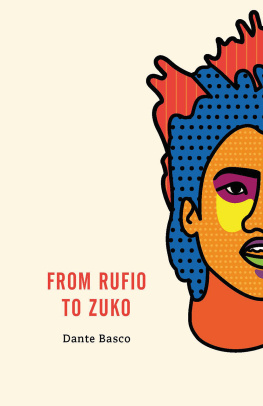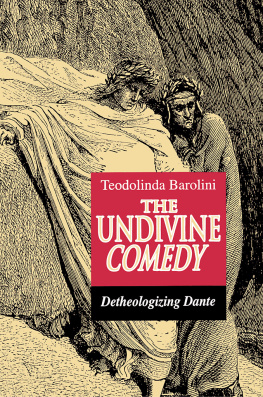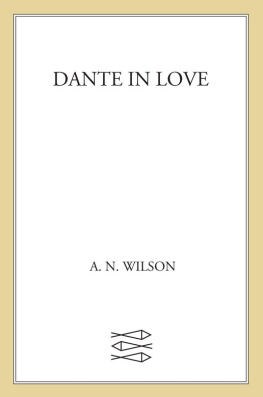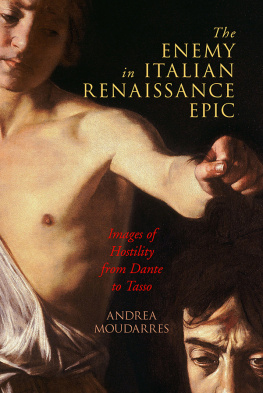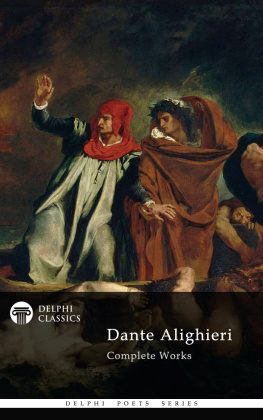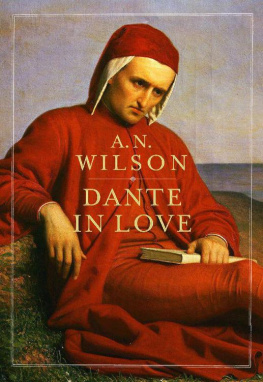Barolini Teodolinda - Dante and the Origins of Italian Literary Culture
Here you can read online Barolini Teodolinda - Dante and the Origins of Italian Literary Culture full text of the book (entire story) in english for free. Download pdf and epub, get meaning, cover and reviews about this ebook. City: New York, year: 2006, publisher: Fordham University Press, genre: Romance novel. Description of the work, (preface) as well as reviews are available. Best literature library LitArk.com created for fans of good reading and offers a wide selection of genres:
Romance novel
Science fiction
Adventure
Detective
Science
History
Home and family
Prose
Art
Politics
Computer
Non-fiction
Religion
Business
Children
Humor
Choose a favorite category and find really read worthwhile books. Enjoy immersion in the world of imagination, feel the emotions of the characters or learn something new for yourself, make an fascinating discovery.

- Book:Dante and the Origins of Italian Literary Culture
- Author:
- Publisher:Fordham University Press
- Genre:
- Year:2006
- City:New York
- Rating:3 / 5
- Favourites:Add to favourites
- Your mark:
- 60
- 1
- 2
- 3
- 4
- 5
Dante and the Origins of Italian Literary Culture: summary, description and annotation
We offer to read an annotation, description, summary or preface (depends on what the author of the book "Dante and the Origins of Italian Literary Culture" wrote himself). If you haven't found the necessary information about the book — write in the comments, we will try to find it.
Dante and the Origins of Italian Literary Culture — read online for free the complete book (whole text) full work
Below is the text of the book, divided by pages. System saving the place of the last page read, allows you to conveniently read the book "Dante and the Origins of Italian Literary Culture" online for free, without having to search again every time where you left off. Put a bookmark, and you can go to the page where you finished reading at any time.
Font size:
Interval:
Bookmark:
DANTE AND THE ORIGINS
OF ITALIAN LITERARY
CULTURE
OF ITALIAN LITERARY
CULTURE
TEODOLINDA BAROLINI


Copyright 2006 Fordham University Press
All rights reserved. No part of this publication may be reproduced, stored in a retrieval system, or transmitted in any form or by any meanselectronic, mechanical, photocopy, recording, or any otherexcept for brief quotations in printed reviews, without the prior permission of the publisher.
Library of Congress Cataloging-in-Publication Data
Barolini, Teodolinda, 1951
Dante and the origins of Italian literary culture / Teodolinda Barolini.ist ed.
p. cm.
Includes bibliographical references and index.
ISBN-13: 9780-82322703-7 (cloth : alk. paper)
ISBN-10: 08232-27030 (cloth : alk. paper)
ISBN-13: 9780-82322704-4 (pbk. : alk. paper)
ISBN-13: 08232-27049 (pbk. : alk. paper)
1. Dante Alighieri, 12651321InfluenceItaly. 2. Italian literatureHistory and criticism. I. Title.
PQ4381.2.B37 2006
851.1dc22
2006029447
Printed in the United States of America
08 07 06 5 4 3 2 1
First edition

This book is dedicated
with much love to the woman
who taught me to read,
my mother,
Helen Barolini,
The Original Reader Against the Grain
Reading Against the Grain:
Musings of an Italianist, from the Astral to the Artisanal
One of the great pleasures of gathering my essays is the opportunity afforded, by looking back, to chart the maze and find its principles of order. The pillars of my critical praxis stand clear in the light of retrospection. One is the importance of learning from the reception, frequently with the goal of demystifying and deinstitutionalizing viewpoints that have been given too much credence and authoritative weight by centuries of repetition. Perhaps this attitude was born in response to working on a text, Dantes Commedia, which has produced masses of repetitive exegesis since the fourteenth century, and in the context of a cultureItalianthat invests excessively in the authority of tradition and indeed in the authority of authority itself. As a young scholar I conceived it my duty to learn what had been written, to wade through many commentaries and lecturae. Ultimately I learned not only to value the rare acuity of the fourteenth-century commentator Benvenuto da Imola or the acerbic wit of Ludovico Castelvetro in the sixteenth century but also how to learn from even the most repetitive and least original contributionswhich involved less attention to the content of what was said, which had usually been said before, than to the fact of these commentaries existence. This authority-laden exegetical tradition taught me that a poet who takes God as his guarantor, like the poet of the Commedia, could generate a commentary tradition, and then exert a pull on his commentators not so dissimilar from that of the Bible. I responded by wanting to study and understand the modalities of how Dante went about constructing an authorial voice that could exert such control, a response that took me first in the direction of intertextuality in Dantes Poets: Textuality and Truth in the Comedy and then of narrative theory in The Undivine Comedy: Detheologizing Dante.
into the narrative without explanation. It is subliminal in the sense that it has gone unremarked. Commentators jumped in to gloss Caina as they jumped in to furnish the absent names of Francescas husband and lover brother-in-law, but they did not comment on the underlying strategy of being compelled to gloss a fictional place as though it were real.
The Commedias authority is centered on its truth claims, again a culturally fractious issue that raises the question of the readers religious beliefs. There are complex cultural factors indisposing Italian scholars from objectivity regarding the Commedias truth claims: either, as believers, they are incapable of taking Dantes prophetic pretensions at face value, since such claims can only be properly made by real (biblical) prophets; or, as lapsed believers, and frequently converts to a militant secularism, they do not want to. At the same time, a very Italian cultural willingness to accommodate the idea of fiction (along with a Catholic willingness to accommodate commentators and glossators, the students of the Decretals whom Dante so scorns) was perhaps also a factor in the persistent view of Dante as poet rather than truth-teller. This willingness has abetted critical confusion by positing an unnecessary either/or between poet and truth-teller that has persisted to this day.
Dantes readers have, on the whole, always been able and willing to distinguish between a poet and a prophet, and they have categorized him as a poet. In fact, for all that Dantes early commentators felt the need to protect their poet from the charge of heresy by insisting on allegory and devaluing his truth claims, it is worth noting that Dante never succeeded in eliciting the attention from the fourteenth-century Italian Church that in our times the novelist Salman Rushdie elicited from the late Ayatollah Khomeini. Hoping to persuade the Ayatollah to take his text less seriously, Rushdie pointed to its artifactuality, but the Iranian mullah held that manipulations of narrative voice and other rhetorical techniques offer an author no protective veil. This is not to say that the fourteenth-century Italian Church was not capable of harsh responses. In 1327, six years after Dantes death, the Italian astrologer, mathematician, and physician, Cecco dAscoli, was burned at the stake. But Cecco did not have the cover of being a great poet, a supreme deployer of narrative voice and fictional tropes. Rather he was an astrologer and medical doctor who used the means of narrative verse in LAcerba to propogate his views. In Why Did Dante Write the Commedia? Dante and the Visionary Tradition, I argue that Dante, who considered himself not a decretalist but a new St. John, wanted to be taken more seriously as a prophet and visionary than Italian culture was prepared to take him: he saw himself as a poet, yes, but also as a teller of truth, a combination that was difficult for his cultural milieu to accept then, and remains difficult to accept today.
Interestingly, and a further reflection of the workings of the Italian cultural imaginary, the canny insertion of a compelling secular story line into the Commedias secolare commentothe centuries-long commentary tradition that is the backbone of the Commedias receptioncould also command acritical acceptance: this is the case, for instance, of Boccaccios novelistic rewriting of Dantes story of Francesca in Inferno 5. Picked up by subsequent commentators, the melodramatic tale of the great raconteur has achieved canonical status and has utterly contaminated the reception of the canto. In Boccaccios tale Fran-cescas free agency, which is what is most at stake for Dante (making Dante, by the way, quite progressive from the perspective of gender, as I show in Dante and Francesca da Rimini: Realpolitik, Romance, Gender, where I also discuss the commentary tradition and Boccaccios wholesale infiltration of it), is put aside: she is effectively innocent of any misdeed, since her father deceives her into wedlock with the ugly Gianciotto through the use of the handsome Paolo as a proxy for his brother. The active cultivation of Boccaccios romance by commentators who repeat his story to this day is a good example of the sometimes willful nature of the exegetical tradition: when a good (love) story is involved, more austere versions of the tale will be eclipsed. Dante is a great poet of silenceFrancescas quel giorno pi non vi leggemmo avante (that day we read no more) (
Next pageFont size:
Interval:
Bookmark:
Similar books «Dante and the Origins of Italian Literary Culture»
Look at similar books to Dante and the Origins of Italian Literary Culture. We have selected literature similar in name and meaning in the hope of providing readers with more options to find new, interesting, not yet read works.
Discussion, reviews of the book Dante and the Origins of Italian Literary Culture and just readers' own opinions. Leave your comments, write what you think about the work, its meaning or the main characters. Specify what exactly you liked and what you didn't like, and why you think so.

